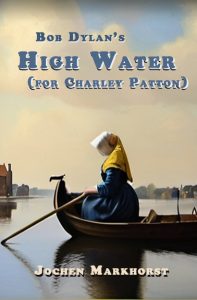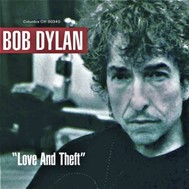 “Maybe you noticed that most of my songs are traditionally rooted. I don’t do that on purpose. Charley Patton’s 30’s blues has made a deep impression on me and High Water (for Charley Patton) is, in my opinion, the best song of this record,” says Dylan at the Rome press conference, July 2001.
“Maybe you noticed that most of my songs are traditionally rooted. I don’t do that on purpose. Charley Patton’s 30’s blues has made a deep impression on me and High Water (for Charley Patton) is, in my opinion, the best song of this record,” says Dylan at the Rome press conference, July 2001.
I do agree. Well, ex aequo with “Mississippi”, anyway. Both songs open the floodgates (no pun intended), and “High Water” belongs in the same outer category as “Desolation Row”, “Mississippi” and “I Contain Multitudes”; extremely rich, poetic, Nobel Prize-worthy musical gems. Lovely, lovely song.
(English, German and Dutch)
————————
High Water (for Charley Patton) (2001) part 23
by Jochen Markhorst
XXIII Love and Theft
 On Wednesday, 4 October 2006, XM Satellite Radio airs episode 23 of Theme Time Radio Hour, with your host Bob Dylan. Today’s theme is “Water”, offering the DJ’s first and only opportunity to play a song by one of his great idols Charley Patton (“the fantastic Charley Patton, testing the waters”): “High Water Everywhere”, obviously. Part 1 only;
On Wednesday, 4 October 2006, XM Satellite Radio airs episode 23 of Theme Time Radio Hour, with your host Bob Dylan. Today’s theme is “Water”, offering the DJ’s first and only opportunity to play a song by one of his great idols Charley Patton (“the fantastic Charley Patton, testing the waters”): “High Water Everywhere”, obviously. Part 1 only;
“It’s called Part One because back in the days of the 78s if you had a song longer than three minutes, you had to split it up on Side 1 and Side 2, because the records were only three minutes long. So you only did a long song when you had something important to say. Like this song, about the most destructive river flood in United States history. The flood also inspired songs by Bessie Smith, Kansas Joe McCoy, Memphis Minnie and Randy Newman.”
By the latter, the DJ is of course referring to Randy Newman’s “Louisiana 1927”, coming up later in this same broadcast. Newman’s 1974 song is probably still hanging in the air on this October day in 2006 after it became a kind of unofficial signature song of the recent Hurricane Katrina disaster and subsequent floods in and around New Orleans, August 2005. The references to Bessie Smith’s “Back-Water Blues” and to “When the Levee Breaks” (Memphis Minnie and Kansas Joe McCoy) are pretty random in themselves. DJ could just as well have mentioned some 20 other songs, all associated with the Great Mississippi Flood too – although Bessie Smith’s song is actually about the Cumberland River flood in Nashville on Christmas Day 1926 – but these two songs, like Patton’s song, float somewhere on the surface of the musician Dylan’s working memory. “Back-Water Blues” was in his repertoire in 1961 (we know the recording from November, Carnegie Hall), and Memphis Minnie’s evergreen he will even honour with a reworking in 2008 (“The Levee’s Gonna Break”, Modern Times).
Kansas Joe McCoy and Memphis Minnie – When the Levee Breaks:
Closing then, after the DJ Dylan and the musician Dylan, the poet Dylan makes his appearance. When the last notes of “High Water Everywhere” have died away, first the DJ spends a few last words on the record:
“Charley Patton, “High Water Everywhere Part 1”. How the backwater rose at Sumner and drove poor Charley down the line. You hear a lot of scratching and hiss on these records. They were so popular they were played to death, and the master recordings were sold for scrap. Some of them even used to lie in chicken coops. And unfortunately, we might never know what Charley Patton really sounded like.”
… but the last words on Patton, and the move to the next record (“Water Water” by Effie Smith and The Squires), are then for the poet Dylan:
“This is from The Rime Of The Ancient Mariner: Day after day, day after day, We stuck, nor breath nor motion; As idle as a painted ship Upon a painted ocean. Water, water, every where, And all the boards did shrink; Water, water, every where, Nor any drop to drink.”
… indirectly adding another sparkling stone to the eclectic mosaic “High Water (for Charley Patton)”.
For eclectic we may well call the song by now. If we stand close to the artwork and distinguish the individual mosaic stones, both those laid aside and those used, we see:
“High Water Everywhere” – Charley Patton, 1929
“Didn’t It Rain” – spiritual, late nineteenth century
“London Bridge Is Falling Down” – nursery rhyme, early eighteenth century
“Joe Turner Blues” – traditional, late nineteenth century
“Kansas City” – Wilbert Harrison, 1959
“Kansas City Blues” – Big Joe Turner, 1951
“I’m Going To Memphis” – Johnny Cash, 1960
“Train 45” – traditional, late nineteenth century
“Nine Hundred Miles” – Woody Guthrie, 1944
“Shake It And Break It” – Charley Patton, 1929
“Hopped-Up Mustang” – Arlen Sanders, 1964
“Hot Rod Harry” – Johnny Bond, 1974
“Wait for the Wagon” – unknown, early 1850s
D’un chateau l’autre – Louis-Ferdinand Céline, 1957
“Chump Man Blues” – Blind Blake, 1929
“As I Went To Bonner” – nursery rhyme, around 1760
Adventures of Huckleberry Finn – Mark Twain, 1884
“Sinner’s Prayer” (the song) – Lowell Fulson, 1950
“Hellhound On My Trail” – Robert Johnson, 1937
“Mad Mama’s Blues” – Josie Mills / Julia Moody, 1920s
“When The Levee Breaks” – Memphis Minnie and Kansas Joe McCoy, 1929
“Vicksburg Blues” – Little Brother Montgomery, 1920s
“Traveling Riverside Blues” – Robert Johnson, 1937
Pissing In The Gene Pool – Henry Rollins, 1987
Now Watch Him Die – Henry Rollins, 1992
Ulysses – James Joyce, 1922
“Po’ Lazarus” – Lead Belly, 1933
“The Coo Coo Bird” – Clarence Ashley, 1929
“Omie Wise” – traditional, early nineteenth century
“Deep Water” – Tom Paley, 1953
Wise Blood – John Huston, 1979
“I Believe I’ll Dust My Broom”- Robert Johnson, 1936
“The Bald-Headed End Of The Broom” – Harry Bennett, 1877
“I Got Love” – Glenn Frey, 1992
Frankenstein – Mary Shelley, 1818
“Crash On The Levee (Down In The Flood)” – Bob Dylan and The Band, 1967
“This World Can’t Stand Long” – Roy Acuff, 1947
Bartleby, the Scrivener – Herman Melville, 1853
“Jim Along Josie” – Edward Harper, 1838
“Terraplane Blues” – Robert Johnson, 1936
Forty mosaic pebbles. Ignoring less traceable fragments like “shacks are slidin’ down” or “coffins droppin’ in the street”, fragments with an undylanesque, idiosyncratic couleur that have presumably also been picked up somewhere by the self-proclaimed thief of thoughts; we don’t talk about fragments that we can hardly decipher in the draft versions (“nothing to buy up there”?, “can’t keep nothing dry”?); and at best look with half an eye at fragments that may appear to be borrowed, but what they would be borrowed from is not entirely unambiguous. Of the unfriendly lines of verse in stanza 2 for example, “You’re dancin’ with whom they tell you to / Or you don’t dance at all”, Warmuth suspects that the ebony ballad “The Boatman’s Dance” from 1843 by “Dixie” composer Daniel Decatur Emmett is a source;
When you go to de boatmans Ball, Dance wid my wife or not at all, Sky blue jacket and tarpaulin hat Look out my boys for de nine tail cat.
… which seems fairly likely, yes. Especially since Dylan will incorporate the reference I lost my gal at the boatman’s ball in “Waitin’ For You” (2002), and will perform Emmett’s greatest hit “Dixie” in Masked And Anonymous. Apparently, he knows the song and its author Emmett, founder of the first blackface minstrel group, the Virginia Minstrels – and in doing so, by the way, Dylan would have smuggled in a blackface reference into “High Water” after all, after deleting the “Jim Along Josie” quote White cat just put out the black cat’s eye.
Bob Dylan – Dixie:
Or a verse excerpt like Water pourin’ into Vicksburg, which has the brutal factuality like we know from Shelby Foote’s standard work The Civil War: A Narrative, the mammoth work from which Dylan does frequently borrow excerpts (on this album in “Floater”, notably), and in which we also find the same setting often enough. In Foote’s reconstruction of Grant’s 1863 Yazoo Pass Expedition along the Mississippi, for example;
On the evening of February 3 — while Ellet prepared to take the Queen past the Vicksburg bluff at daybreak and Grant himself was about to head upriver for a first-hand look at Lake Providence — Wilson mined and blew the levee sealing the mouth of Yazoo Pass. The result was altogether spectacular, he reported, “water pouring through like nothing else I ever saw except Niagara.”
… pouring water causing wet feet for people from Clarksdale to Tutwiler, from Sumner to Rosedale and Greenville, and from Rolling Fork to Vicksburg.
Verse fragments, in short, whose rough outlines can be found in obvious sources of inspiration, which, in fairness, cannot quite claim the honourable stamp of “Dylan song supplier”. At least, not for “High Water” – after all, elsewhere in Dylan’s oeuvre, borrowings from The Civil War, from Daniel Decatur Emmett’s songs, and from all those others are undeniably demonstrable. About which, incidentally, the songwriter was perfectly clear both in the album’s title and forty years before “Love And Theft”, in the liner notes of The Times They Are A-Changin’:
Yes, I am a thief of thoughts not, I pray, a stealer of souls I have built an’ rebuilt upon what is waitin’
To be continued. Next up High Water (For Charley Patton) part 24: Via Sistina 69, Rome
Jochen is a regular reviewer of Dylan’s work on Untold. His books, in English, Dutch and German, are available via Amazon both in paperback and on Kindle:
- Blood on the Tracks: Dylan’s Masterpiece in Blue
- Blonde On Blonde: Bob Dylan’s mercurial masterpiece
- Where Are You Tonight? Bob Dylan’s hushed-up classic from 1978
- Desolation Row: Bob Dylan’s poetic letter from 1965
- Basement Tapes: Bob Dylan’s Summer of 1967
- Mississippi: Bob Dylan’s midlife masterpiece
- Bob Dylan’s Greatest Hits
- John Wesley Harding: Bob Dylan meets Kafka in Nashville
- Tombstone Blues b/w Jet Pilot: Dylan’s lookin’ for the fuse
- Street-Legal: Bob Dylan’s unpolished gem from 1978
- Bringing It All Back Home: Bob Dylan’s 2nd Big Bang
- Time Out Of Mind: The Rising of an Old Master
- Crossing The Rubicon: Dylan’s latter-day classic
- Nashville Skyline: Bob Dylan’s other type of music
- Nick Drake’s River Man: A very British Masterpiece
- I Contain Multitudes: Bob Dylan’s Account of the Long Strange Trip
- Bob Dylan’s Rough And Rowdy Ways – Side B
